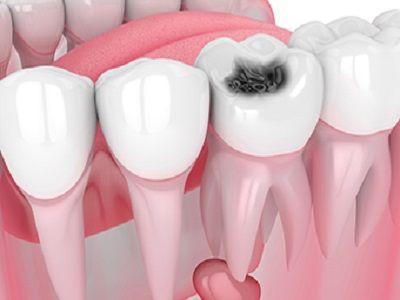Tooth Cyst : Causes, Symptoms, and How to Treat
Ever noticed or felt small pockets around your teeth or gums? This condition is known as a dental cyst. Cysts often cause no symptoms but if they become infected, they can become a serious problem if not treated immediately. Check out the full explanation of the causes, symptoms, and treatment below!
BODY HEALTHTOOTH CYSTTOOTH CYST CAUSESTOOTH CYST SYMPTOMSHOW TO TREAT TOOTH CYSTDENTAL HEALTH TIPS
11/20/20243 min read


Tooth cysts are small pockets of fluid that grow around the upper gums or teeth. This condition often causes no symptoms, unless the cyst becomes infected. There are various types of tooth cysts that can be differentiated based on the cause of the condition. However, periapical cysts and dentigerous cysts are the 2 most common types.
Dentigerous Cyst
Dentigerous cysts are commonly found in the area of impacted teeth, which are teeth that can only grow partially or not at all and are buried under the gums. Therefore, this type of cyst can easily be found on molars, especially wisdom teeth.
The exact cause of dentigerous cysts is not yet known. However, this condition is thought to occur due to genetic factors.
Periapical Cyst
Periapical cysts grow at the root end of a dead tooth. These dead teeth usually occur as a result of cavities that are left untreated for too long, causing inflammation of the tooth root tissue (pulpitis) and eventually nerve death in the tooth.
In addition, tooth cysts can also occur due to the following conditions:
Having had a tooth cyst removed that was not complete
A buildup of debris or fluid in the tooth follicle due to incomplete tooth growth
The tooth-forming tissue under the gum is left behind and forms a tale.
Symptoms of a Tooth Cyst
Tooth cysts do not grow immediately but gradually and over a long period of time. This condition rarely causes symptoms so it is difficult to recognize and can only be known if the patient undergoes an examination. In cases where the size of the cyst is more than 3 cm, the patient will only complain.
Common symptoms that occur due to the appearance of tooth cysts are:
Increased tooth sensitivity
Cavities and abscesses or pus from the gums
Swelling of the gums and tooth pain in the affected area
Gums that are overgrown with lumps
Changes in tooth position and formation of new gaps between teeth
When to See a Dentist?
Immediately go to the doctor if you or your loved ones experience one or more of the symptoms mentioned above. That way, the doctor will immediately find out the cause of the complaint and immediately provide the right treatment for you.
Treatment of Tooth Cyst
In general, an effective treatment for patients with tooth cysts is to remove the cyst. However, there are some cases where the condition does not require special treatment and can heal on its own.
If a tooth cysts needs treatment, the doctor will adjust it according to the cause of the patient's complaint, such as:
Periapical Cyst Treatment
The treatment that can be done is to undergo root canal treatment to treat small periapical cysts. In this procedure, the doctor will remove the damaged root canal and clean the cavity in the pulp and patch it to prevent recurrent infection.
For large periapical cysts, the doctor will perform a combination of treatment, including root canal treatment, cyst removal and tooth filling.
Dentigerous Cyst Treatment
Dentigerous cysts are commonly found in the area of impacted teeth, which are teeth that can only grow partially or not at all and are buried under the gums. Therefore, this type of cyst can be easily found in the molars, especially the wisdom teeth.
The exact cause of dentigerous cysts is not yet known. However, this condition is thought to occur due to genetic factors.
In addition, to treat infection and reduce complaints, the doctor may administer antibiotics and painkillers, both before and after treatment procedures for periapical and dentigerous cysts.
📝Read also : What is Tooth Impaction ?
Prevention of Tooth Cysts
To reduce the risk of tooth cysts, there are several things that can be done, such as:
Brushing your teeth at least twice a day using toothpaste with fluoride content
Cleaning between the teeth every day using dental floss
Gargle with a special medication after eating or snacking but do not rinse your mouth after brushing your teeth, it can reduce the benefits of the toothpaste used
Reduce the consumption of foods and drinks with high sugar content and avoid foods and drinks that are acidic and contain alcohol to avoid damaging the teeth and triggering cysts
Conduct regular dental health checks at least once every 6-12 months
Immediate examination to get proper treatment if symptoms of tooth impaction, such as pain and swollen gums in the area of the last molars.
Tooth cysts are small sacs filled with fluid that usually form and appear around dead or impacted teeth. Prevention of tooth cysts can be done by maintaining good oral hygiene and undergoing regular dental check-ups. Early detection of the symptoms of this condition is very important, as cysts found early can be treated with simple procedures. However, if they become enlarged, treatment will involve more complex procedures and take up a lot of your time.
With proper understanding and treatment, the risk of complications can be minimized so that your oral health is maintained. If you experience one or more of the symptoms above, immediately consult your dentist for proper diagnosis and treatment. Greetings my friend!
cavities will lead to periapical cysts if left untreated
